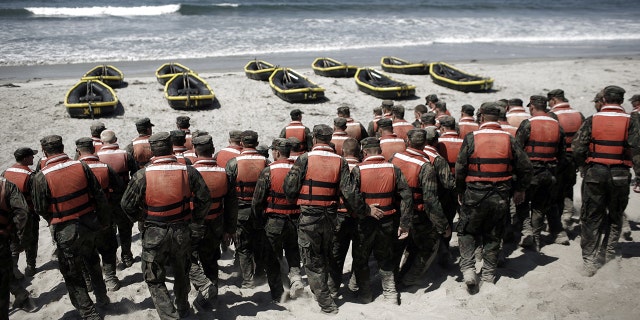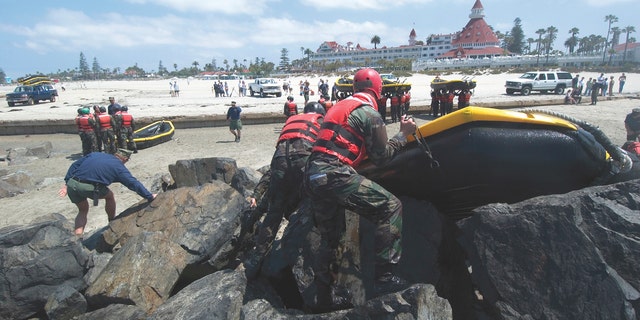A Navy SEAL candidate who had just completed what’s known as “Hell Week” at the end of the first phase of BUD/S (Basic Underwater Demolition) training in Southern California died Friday after falling ill, according to reports.
Another BUD/S candidate remained hospitalized in stable condition, FOX 5 of San Diego reported.
The Navy said the candidates were not actively training in Coronado, California, near San Diego, when they required hospitalization and nothing alarming had happened during Hell Week, the station reported.
The trainee who died had been taken to Sharp Coronado Hospital while the other candidate remained at Naval Medical Center San Diego.
Navy SEAL candidates undergo Hell Week during the last week of the first phase of BUD/S training in Coronado, California, in 2018. The candidate who died is not pictured.
(U.S. Navy photo by Petty Officer 1st Class Abe McNatt)
The deceased trainee has not been identified, pending notification of family. His cause of death wasn’t immediately known, according to the Navy.
Naval Special Warfare Command has opened an investigation.
‘Courageous, talented sailors’
“My prayers are with the family and loved ones of the deceased during this very difficult time, and I wish for a full recovery of the other candidate reported injured yesterday,” U.S. Rep. Scott Peters, D-Calif., said in a statement, according to FOX 5. “These courageous, talented sailors were on their way to becoming some of our country’s most elite military personnel. We must find out what transpired so we can do whatever we can to keep others safe. In the days and weeks ahead, I look forward to learning more as the Navy conducts a thorough investigation.”

A group of Navy SEAL trainees in August 2010 during Hell Week at a beach in Coronado, California.
(Getty Images)
During “Hell Week,” candidates get only about four hours of sleep in five and a half days while they do everything from carrying logs and rubber boats over their heads to rock portage on the beach to lying in freezing ocean water.
Tough challenge
On average, only around 25% of candidates successfully make it through Hell Week each year, according to NavySEALs.com. Many of those who don’t make it voluntarily quit.

This undated photo shows SEAL candidates conducting rock portage during BUD/S training in front of the luxurious Hotel del Coronado.
(Getty Images)
The most recent BUD/S death occurred in 2016 when James Derek Lovelace, 21, died during a swimming exercise. His death was ruled a homicide by drowning but after an investigation, the Navy said it would not pursue criminal charges.
CLICK HERE TO GET THE FOX NEWS APP
An autopsy revealed he had an enlarged heart that contributed to his death, and he also had an abnormal coronary artery, which has been associated with sudden cardiac death, especially in athletes. It wasn’t clear how much that factored into his death.
The Navy didn’t immediately respond to Fox News’ overnight request for comment.
The Associated Press contributed to this report.